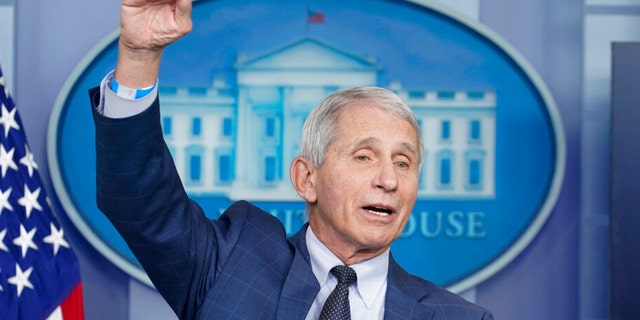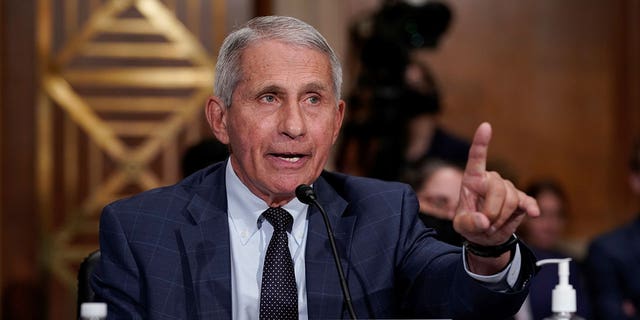Fauci doesn’t remember that study he based hydroxychloroquine COVID treatment claims on was retracted
Dr. Anthony Fauci testified last week he couldn’t recall that a major study published in an influential medical journal was retracted after it erroneously found that hydroxychloroquine was ineffective and potentially harmful in treating COVID-19 and couldn’t remember the names or details of other studies he leaned on to back his claim that the drug was ineffective.
Fauci, White House chief medical adviser and director of the National Institute of Allergy and Infectious Diseases, was deposed under oath by state GOP attorneys general Eric Schmitt and Jeff Landry as part of their lawsuit against the Biden administration.
The two AGs have accused top-ranking government officials of working with Twitter, YouTube and Meta, which owns Facebook, to censor viewpoints on COVID that went against the Biden administration’s position.
On Monday, Schmitt released a full transcript of the deposition, which revealed Fauci said he based his claim hydroxychloroquine was ineffective in treating COVID on “a number of studies” even though he couldn’t recall the names or details of them when pressed under oath. In the early years of the worldwide pandemic, the use of hydroxychloroquine became a controversial treatment that Fauci opposed.
WHITE HOUSE LAVISHES PRAISE ON DR. FAUCI FOR HIS ‘LEADERSHIP AND LEGACY’ AS HE DELIVERS ‘FINAL MESSAGE’
When Missouri Solicitor General John Sauer asked Facui why he disagreed with claims that hydroxychloroquine could be used to treat COVID, Fauci responded that there was a “lack of any evidence whatsoever that hydroxychloroquine was effective against coronavirus.
“Subsequently, papers were published showing a lack of effect of hydroxychloroquine,” Fauci added.
“Is that one of the pieces of misinformation or disinformation that may cause loss of lives that you referred to earlier, in your view?” Sauer asked.
FAUCI COULDN’T RECALL CRITICAL COVID DECISIONS DURING DEPOSITION: REPUBLICAN AG
“The claim, based on no data, juxtaposed on clear-cut clinical data showing that hydroxychloroquine does not work,” Fauci said.
“If one propagates this concept that hydroxychloroquine is highly effective and people take it based on that information, which is incorrect, yes, that would be misinformation or even disinformation that could lead people to take a drug that would not help them, that could possibly hurt them,” he added.
During the deposition, Sauer referenced a Politico article published in May 2020, titled “Fauci: Hydroxychloroquine not effective against coronavirus.”

“Fauci’s comments come days after The Lancet published a 96,000-patient observational study that concluded that hydroxychloroquine has no effect on COVID-19 and may have even caused some harm,” the article states.
“Was that, in fact, the basis of your statement that the scientific data is really now quite evident about lack of efficacy?” Sauer asked Fauci.
FAUCI DEPUTY WAS ‘VERY IMPRESSED’ WITH CHINA’S COVID LOCKDOWN METHODS, DESPITE ‘GREAT COST’
“That could be. Again, you’re going back a couple of years. It is quite consistent with that. … So this could have been the study that I was referring to. I’m not 100% certain,” Fauci responded.
According to the transcript, Sauer asked Fauci to review a copy of The Lancet Journal, noting that the published date was May 22, 2020, five days before the Politico article was published. Sauer also pointed out that the study in the Journal was retracted.
“Were you aware that it was retracted at the time? Do you have any recollection of that?”
“I don’t recall it being retracted. I might have at the time heard that it was retracted, but it wasn’t the only paper that was on hydroxychloroquine,” said Fauci.

“Did you — was your opinion based on other papers as well?”
“My — I mean, I’m thinking back, then, my — my opinion of the effect of hydroxychloroquine was based on accumulating data from a number of studies. I don’t recall specifically what those studies are now,” the doctor said.
CLICK TO GET FOX NEWS APP
On June 4, 2020, two influential medical journals — The New England Journal of Medicine and The Lancet — retracted the study because three of its authors “were unable to complete an independent audit of the data underpinning their analysis.”
“As a result, they have concluded that they ‘can no longer vouch for the veracity of the primary data sources,'” The Lancet said in a statement at the time.
Read the full article Here


